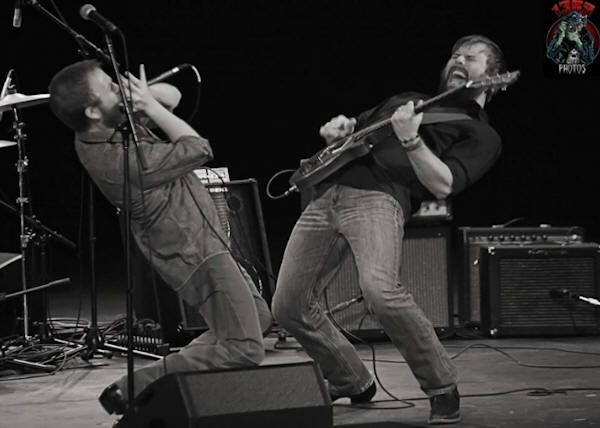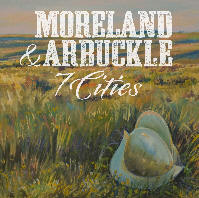|
Alan: What are your first musical memories growing up in
Kansas?
AM: I grew up in rural Kansas on classic rock radio, bands
like Deep Purple and ZZ Top. There are several moments that
were life changing for me. The first time was hearing KISS
and JEFFERSON AIRPLANE when I was 5 years old. When I was
about 14 years old, the guitar solo on Zeppelin’s “Whole
Lotta Love” absolutely blew my mind. Two such other events
occurred like this. When I was 16 years old Nirvana changed
the way I saw the musical world. This also occurred at age
22 when I discovered Son House’s recording of “Death Letter
Blues”. That put me on a course of spending the subsequent 7
years playing acoustic blues only. Its a never ending
journey!
Alan:
Did you come from a musical family - is there a long musical
heritage? If not, where did your inspiration to make music
a way-of-life come from?
AM: Yes, my father was a musician. He did not have a hand in
raising me at all, but he was a guitar player - as was his
father, his brothers and some other family members. Just
like athletic ability, I believe that certain talents and
personality characteristics are inherited. As long as I can
remember, music has always been a mega strong force for me
that has spoken volumes to my being in every way.
Alan:
Did you always want to become a musician and how did you
actually get started in music?
DA: For me it was getting into blues that made me want to
play music. I first heard the music kind of by chance when I
was about 15 years old, and once I started to dig into it a
little bit, my life was changed. Old school blues moved me
in a way that no other music ever had at that time. I’d been
singing since I could talk, but that was the first time I
really gave any thought to starting a band or anything of
that nature. I started playing with a few guys I knew from
school and it didn’t take me long to decide that music was
the thing around which I wanted to center my life.
Alan:
What kind of material were you both playing in the early
days and who were your heroes?
AM: We started the band out as a duo, just Dustin and I
performing as an all acoustic pre-war duo all the while, we
also had an electric quartet called the King Snakes. after
we had lost our second bass player in that band, we decided
that we would just combine the both groups and make
ourselves far more marketable. Our heroes list is vast---
with everyone from Robert Johnson, Son House, Muddy Waters,
Led Zeppelin, to Johnny Cash and Otis Redding, etc.
Alan:
Where did you first meet and with your wide range of musical
interests what brought you together?
DA: Aaron and I first met and jammed at an open mic night in
Wichita, KS in 2001. After that we didn’t run into each
other for some time. In spring of 2002 Aaron was making a CD
and wanted a harmonica player for a few tracks. Some friends
of mine in our local blues society pointed him in my
direction. After we made the recording, we started jamming
and doing some shows together, playing acoustic, Mississippi
style blues. We pretty quickly realized that we had very
strong musical chemistry and we became fast friends. A dozen
years later, here we are.

©
Copyright 2014 Jon T Cruz. All Rights Reserved. Used with
permission.
Alan:
Who has influenced you the most in your music writing and
playing?
AM: This really varies. We are fans of all kinds of cool
music. We are really into tons of traditional blues.
Starting with early blues with guys like Charley Patton, Son
House, Muddy Waters etc. Bits of every other genre we adore
creeps into our sound and songwriting as well. Soul music,
classic country, stoner rock, classic rock, etc all rear
their heads in our musical “stream of consciousness”.
Alan:
You're known for your love of all sorts of American music
with blues at the core, but what does the blues mean to you?
AM: To me blues is a feeling that is accomplished musically
by certain rhythms, patterns, scales, and note choices. Its
one of those things that is hard to define, but you know it
when you hear it. I have read all kinds of academic
explanations of what makes certain music “blues”, but that
stuff just goes over my head. Bottom line, you can feel what
is blues, and what is not.
Alan:
Aaron, you play a cigar box guitar, tell me a little about
it and how it fits your style of playing. Was it made
especially for you?
AM: Yes, a friend on mine named Mike Snider makes them
especially for me. I love them for their full sound. The
fact that I can play bass lines, rhythm guitar, and lead
guitar on it at the same time makes it a very appealing
instrument for our chiefly bass-less sound.
Alan:
In 2008 you both went to Iraq to play for the American
troops stationed there, that must have been quite an
experience.
DA:
I’ll never forget one day when we were touring the hospital
of the base we were to play that night, talking to soldiers
who had been wounded or injured. We came to the back of the
room, to a guy who was looking very depressed. He’d been
laid up with a bad infection in his leg for weeks and hadn’t
been able to get around or see hardly any of his friends in
that time. He was a blues fan, so he was especially bummed
to be missing the show that night. I had a harmonica with me
and asked if he’d like to hear a tune. He said yes, so I
played and we all sang for him. It just lit him up, seemed
like it turned his whole day around. A nurse from the ward
came to the show that night and told us the soldier was
smiling and talking the rest of the day. It was a really
moving experience. I’ve always believed in the healing power
of music, but I’ve hardly ever seen in work in practice as
much as that day.
 Alan:
You released 4
self-produced albums in 2005, 2006, 2008 and 2011 and now
have your fifth album '7 Cities', tell me about the theme
for the album, how it came about and your selection of the
tracks. Alan:
You released 4
self-produced albums in 2005, 2006, 2008 and 2011 and now
have your fifth album '7 Cities', tell me about the theme
for the album, how it came about and your selection of the
tracks.
DA:
We were all born, raised, and still live in
the state of Kansas. The album title and the story of the
opening track, “Quivira” both come from a piece of early
Kansas history. In 1541 the Spanish conquistador, Francisco
Vasquez De Coronado explored the plains of what became
Kansas looking for the fabled civilization of Quivira, and
seven cities of gold. His search was, of course,
unsuccessful. As we were putting together the songs for the
record, we found that even beyond the song “Quivira”, the
whole album was telling a this story about a search for
wealth and power, followed by the inevitable downfall. We
ended up making our first concept album almost by accident.
Alan:
Are there any
particular songs that you play that have special meaning to
you?
AM: We have a
tendency to close most of our shows with JOHN HENRY. This
song is perhaps the oldest of all songs we play. It has a
tremendous story lyrically to it. In addition, the power and
grit in which we play this tune moves audiences unlike most
any other song that we play. It has power in our set that is
unmatched.
[Check
out John Henry on YouTube]
Alan: You are currently on a UK tour, so what's next and
when will you be back in the UK?
AM: We are just starting a 10 day-long tour of the UK. We
will stay in Europe for a month and this tour will take us
to Switzerland, Italy and Spain. Not sure exactly when we’ll
be back here in the UK, but I hope it won’t be too long!
Alan: Thank you
both and have a good tour.
|